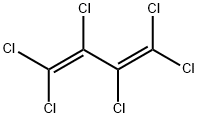A6799112
Perchlorobutadiene Standard , 2000ug/mlinPurgeandTrapMethanol , 87-68-3
Synonym(s):
Perchlorobutadiene
CAS NO.:87-68-3
Empirical Formula: C4Cl6
Molecular Weight: 260.76
MDL number: MFCD00000836
EINECS: 201-765-5
Update time: 2022-07-08
PRODUCT Properties
| Melting point: | -19 °C |
| Boiling point: | 210-220 °C(lit.) |
| Density | 1.68 |
| vapor pressure | 0.2 mm Hg ( 20 °C) |
| refractive index | n |
| Flash point: | 210-220°C |
| storage temp. | +4°C |
| solubility | Soluble in ethanol and ether (U.S. EPA, 1985) |
| form | liquid, clear |
| Odor | faint turpentine odor |
| Water Solubility | (mg/L): 4.78 at 25 °C (shake flask-LSC, Banerjee et al., 1980) 4 at 20–25 °C (Geyer et al., 1980) |
| Merck | 14,4678 |
| BRN | 1766570 |
| Henry's Law Constant | 3.55, 5.87, 6.90, 10.5, and 15.3 at 2.0, 6.0, 10.0, 18.0, and 25.0 °C, respectively (EPICS-SPME,
Dewulf et al., 1999) |
| Exposure limits | Potential occupational carcinogen. NIOSH REL: TWA 20 ppb (240 mg/m3);
ACGIH TLV: TWA 0.02 ppm (adopted). |
| Dielectric constant | 2.6(Ambient) |
| Stability: | Stable. Incompatible with rubber, oxidizing agents. |
| Surface tension | 36mN/m at 20°C |
| CAS DataBase Reference | 87-68-3(CAS DataBase Reference) |
| IARC | 3 (Vol. 73) 1999 |
| EPA Substance Registry System | Hexachlorobutadiene (87-68-3) |
Description and Uses
Hexachlorobutadiene was first synthesized in 1877 by chlorination of hexyl iodide. It is an industrial by-product of tetrachloroethylene, trichloroethylene, and perchloroethylene production.
Produced as an unwanted by-product during the production of tetrachloroethylene, trichloroethylene, carbon tetrachloride, and chlorine; formerly used as a pesticide in other countries
Safety
| Symbol(GHS) |    GHS06,GHS08,GHS09 |
| Signal word | Danger |
| Hazard statements | H301-H310-H315-H319-H351-H410 |
| Precautionary statements | P202-P273-P280-P301+P310-P302+P352+P310-P305+P351+P338 |
| Hazard Codes | T,N,F |
| Risk Statements | 24/25-34-40-50/53-39/23/24/25-23/24/25-11 |
| Safety Statements | 26-36/37/39-45-61-60-36/37-16-7 |
| RIDADR | UN 2279 6.1/PG 3 |
| OEB | C |
| OEL | TWA: 0.02 ppm (0.24 mg/m3) [skin] |
| WGK Germany | 3 |
| RTECS | EJ0700000 |
| TSCA | Yes |
| HazardClass | 6.1 |
| PackingGroup | III |
| HS Code | 29032990 |
| Hazardous Substances Data | 87-68-3(Hazardous Substances Data) |
| Toxicity | LD50 in male, female mice, rats (mg/kg): 105, 76, 216, 175 i.p.; 80, 65, 250, 270 orally (Gradiski) |


